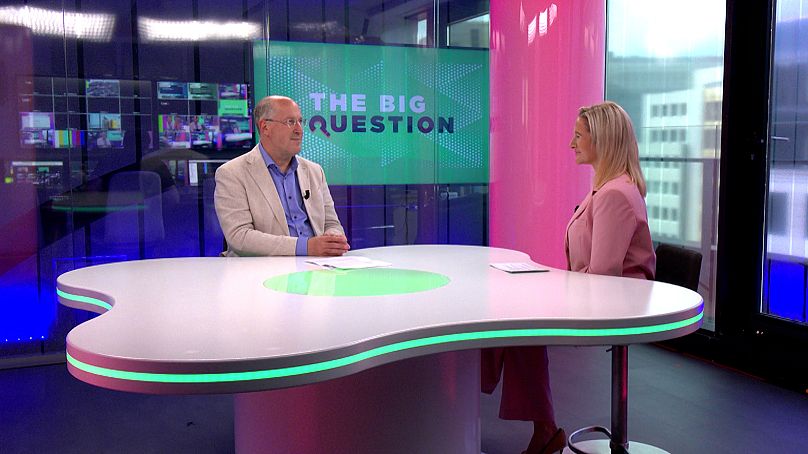In this episode of The Big Question, the European Banking Federation CEO shares his thoughts on ending fossil fuel investments and the problem with doing it too quickly.
The EU Green Deal aims to build a Europe with clean energy and sustainable industries, with a target for climate neutrality by 2050. However, as the drive for clean energy continues so does the financing of fossil fuels, as a complete move away from oil and gas would lead to energy security risks.
 ADVERTISEMENT
ADVERTISEMENT
 ADVERTISEMENT
ADVERTISEMENT
According to research, the world’s banks have given around €6.5 trillion to the fossil fuel industry since the signing of the Paris Climate Agreement in 2016.
The Banking on Climate Chaos report claimed Barclays ranked 8th globally, as Europe’s biggest contributor. However, Barclays has pledged to provide $1 trillion (€923.9bn) of Sustainable and Transition Financing between 2023 and the end of 2030. Moreover, earlier this year, the bank pledged to halt the direct financing of new oil and gas projects, and to restrict financing for companies that focus exclusively on fossil-fuel exploration and extraction.
The bank, like many of its peers, is also stepping up pressure on energy clients to adjust their business so they can be treated as transition assets.
With deadlines drawing ever closer and sustainability pledges in place, The Big Question’s Angela Barnes spoke to Wim Mijs, the CEO of the European Banking Federation, to discuss why divesting isn’t quite as simple as it seems and what other challenges lay ahead in European banking.
What would happen if we cut off all fossil fuel investments tomorrow?
Wim says banks play an important role in financing the green transition and helping energy companies move into a future with alternative energy sources.
While cutting off investments from one day to the next would certainly be a quick and easy way for a bank to go green quickly, Wim warns of the consequences.
“What have you done then? You have undermined your role as a bank in society because this will lead to mass unemployment, it will lead to social unrest and in my view, it's the duty of banks to set clear goals of what we expect when we fund the future of these kind of companies, and that they have a clear plan to go to a fossil free future, but not cut off immediately, that would be completely irresponsible.”
“Having said that, the sustainable [development] goals are essential for our future, the future of our children,” Wim added.
How can Europe achieve sustainable development goals?
In order to achieve sustainable development goals, Wim noted how we need to continue to invest in European business and industry.
However, Wim says one of the key things holding us back is the limitations on cross-border investment.
“We need to fund our transition to a more sustainable economy. We need to fund the digital transition. We need to spend more on defence. And every politician in Europe has made that calculation that they will not be able to fund that through tax money from citizens.”
The idea of the Capital Markets Union has long been touted as a solution for this. But it’s also been a long time in the making. (It was first launched in 2014 by former president of the European Commission, Jean-Claude Juncker.)
“We analysed it to death, but we didn't do anything about it. Having said that, the political momentum is now there,” Wim said optimistically.
Without it, Wim fears business talent will continue to look across the pond for growth as Europe falls behind in competitiveness.
“We have brilliant minds on this continent but everybody always tells me that a fintech or brilliant tech solutions, the first 20 million of their company, they invest in Europe and they build in Europe.
“And the moment they hit 20 million, they go over the Atlantic to the United States, because the capital markets and private equity are better developed.”
How will the US election affect the European economy?
The US’s Inflation Reduction Act, which as Wim pointed out is about neither inflation nor reduction, has played a great role in the country’s continued competitiveness, alongside a deep investment pool.
However, politics can play into the markets and now everyone is wondering, how will the results of the US elections affect the market?
“Normally, if Republicans win, there is this almost knee-jerk reaction of markets upwards, because Republicans may mean more emphasis on the economy. It may mean lower taxes. And that is positive.
“Having said that, of course, the uncertainty in the market is how a newly elected President Trump would react to geopolitical developments. So that's the uncertainty. But in this uncertainty, I would say most is certain.”
The Big Question is a series from Euronews Business where we sit down with industry leaders and experts to discuss some of the most important topics on today’s agenda.
Watch the video above for the full conversation with the European Banking Federation.











